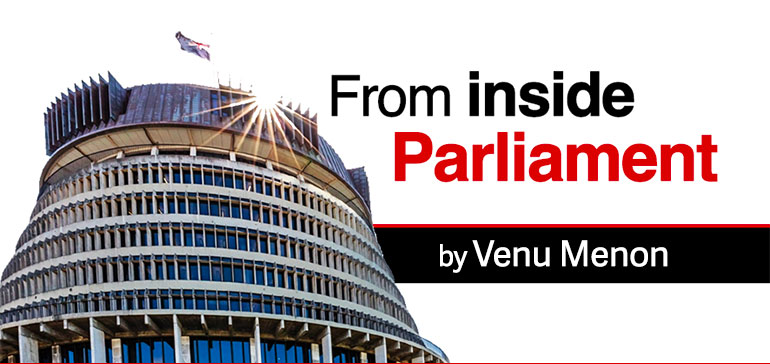Thursday, March 9, 2023
Venu Menon in Parliament

After a lengthy back and forth with Prime Minister Chris Hipkins on the Labour government’s "wasteful spending," Leader of the Opposition and National Party leader Christopher Luxon zeroed in with a multiple-choice question mocking Hipkins for his handling of ministerial portfolios, past and present.
“Which is worse?” Luxon asked, “his track record as public service minister, where he failed to rein in consultant spending, his track record as education minister, where he failed to lift achievement, his track record as police minister, where he failed to bring down crime, or his track record so far as Prime Minister, where he’s failed to do anything?”
Luxon was addressing Parliament on March 8 during the debate on the Prime Minister’s statement which was adjourned on 22 February 2023.
The debate centred on the question set out in the Prime Minister’s statement, that the House “expresses confidence in the government and commends its programme for 2023,” and the amendment proposed to it by the Opposition.
In the amendment, Opposition Leader Luxon said “this House has no confidence in this government which is known for three things: wasteful spending, an inability to get things done, and for building bureaucracies instead of improving frontline outcomes for New Zealanders.”
Prime Minister Hipkins parried Luxon’s Hobson’s choice-type question by replying: “I reject all of the above, but particularly on crime. I’d note that during the time I was the Minister of Police the number of ram-raids that were being conducted fell by three-quarters. So, a 75 per cent reduction in that through some intensive intervention on the part of the Government.”
The PM rounded off with a barb directed at Luxon:
“The member so far doesn’t seem to be able to get past bumper sticker slogans and come up with any concrete actual ideas about how to make New Zealand a better place to live.”
In an apparent effort to establish the widely-held correlation between truancy in schools and the spike in retail crime, ACT Party leader David Seymour rose to his feet asking the Prime Minister to “explain mathematically what impact 82 new truancy officers will make on just under 100,000 chronically absent students?”
Hipkins told the House the attendance officers would be working closely with schools to get absentee students “back into the classrooms on a more regular basis.”
The Prime Minister stressed the role of families in the process of weaning children away from truancy. He said additional funds had been provided to get kids “who are not enrolled, or who are not regularly engaged, and who are at that chronic end of non-attendance” back to education.
Dissatisfied with the PM’s explanation, Seymour pressed on. He called for a Point of Order, pointing out that his question turned on the word “mathematically.”
Seymour sought to impress upon the Speaker that “he [the PM] hasn’t addressed the fact that he’s got 82 people trying to chase about 100,000 kids.”
But Speaker Adrian Rerawhe overruled the ACT leader, which led to some tense exchanges between the two before Seymour backed down after the Speaker asked if he was challenging his ruling.
At its sitting the previous day, Parliament had heard Minister of Police Stuart Nash applaud “the men and women in blue” who upheld law and order.
In what appeared to be an answer to the demand by ram-raid victims for harsher punishments for offenders, the minister told the House: “We need less prisons because the police operating model doesn’t mean they’re soft on crime. It doesn’t mean they let people go; they still go really, really hard when it’s necessary.”
In a direct reference to the Government’s rehabilitation and community support measures for underaged offenders, Nash said the preferred approach was “to work with that person, with the community to come up with better outcomes.”
“When you put someone in prison, not only do you take away their freedom, you often take away their future,” the police minister told the House.
